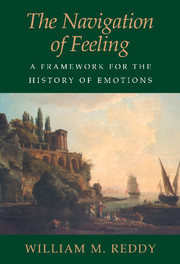Book contents
- Frontmatter
- Contents
- Preface
- Part I What are Emotions?
- Part II Emotions in History: France, 1700–1850
- Conclusion
- Appendix A Detailed Review of Anomalous Cases from the Gazette des Tribunaux Sample
- Appendix B Detailed Review of Anomalous Cases from the Tribunal Civil de Versailles Sample
- References
- Index
Preface
Published online by Cambridge University Press: 07 September 2009
- Frontmatter
- Contents
- Preface
- Part I What are Emotions?
- Part II Emotions in History: France, 1700–1850
- Conclusion
- Appendix A Detailed Review of Anomalous Cases from the Gazette des Tribunaux Sample
- Appendix B Detailed Review of Anomalous Cases from the Tribunal Civil de Versailles Sample
- References
- Index
Summary
“In the past twenty years,” psychologists Kurt W. Fischer and June Price Tangney remarked in 1995, “there has been a revolution in the study of emotion” (p. 3). As I quickly found after beginning this project, theirs was no understatement. In experimental psychology alone, hundreds of studies of emotion have been published and new paradigms proposed since the mid-1970s. Other disciplines have developed new interest in emotions, for their own reasons. But, despite the many positive findings this new research has generated, the revolution has done little to clear up the vexed question of what, exactly, emotions are. Disagreements persist, uncertainties abound. Some researchers (such as Panksepp 1992; or Drevets & Raichle 1998) are convinced they have identified the biological and neural substrates of emotional arousal. But others insist that hormones, skin conductance levels, and cerebral blood flows are not “emotions.” “No psychologist knows what anger, fear, or shame are independent of folk knowledge,” said one group of psychologists recently (Shaver, Morgan, & Wu 1996:83).
Perhaps, then, emotions are nothing more than constructs of “folk knowledge”? “Emotion is culture,” says ethnographer Benedicte Grima (1992:6). Anthropologist Niko Besnier – like most of his colleagues, slightly more circumspect than Grima – comes close to saying the same thing: “I do not wish to claim that all emotions are socially constructed, and that emotions are socially constructed in all contexts of social life”; nonetheless “many emotions are collectively constructed and crucially dependent on interaction with others for their development” (1995a:236).
Information
- Type
- Chapter
- Information
- The Navigation of FeelingA Framework for the History of Emotions, pp. ix - xivPublisher: Cambridge University PressPrint publication year: 2001
Accessibility standard: Unknown
Why this information is here
This section outlines the accessibility features of this content - including support for screen readers, full keyboard navigation and high-contrast display options. This may not be relevant for you.Accessibility Information
- 1
- Cited by
